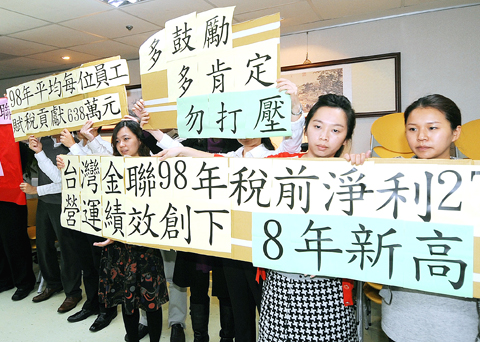State-funded Taiwan Asset Management Co (TAMC, 台灣金聯資產管理) chairman Chen Song-chu (陳松柱) was dismissed from office, effective immediately, for alleged inappropriate use of the company’s stock earnings, Deputy Minister of Finance William Tseng (曾銘宗) said yesterday.
The government has appointed TAMC president Chao Jung-fang (趙榮芳) to replace Chen temporarily, Tseng said, adding that the new chairmanship would be decided at a shareholders’ meeting in June.
Tseng’s remark came after Premier Wu Den-yih (吳敦義) told Democratic Progressive Party (DPP) Legislator Yeh Yi-jin (葉宜津) during a question-and-answer session at the legislature earlier yesterday that the government had “dealt with” the appointment of Chen.

PHOTO: FANG PIN-CHAO, TAIPEI TIMES
Chinese Nationalist Party (KMT) Legislator Alex Fai (費鴻泰) on Monday accused Chen and some of his employees of lining their own pockets, after he learned that Chen shared nearly NT$80 million (US$2.5 million) from the company’s stock investment profits last year with employees — including himself — in forms such as birthday bonuses and travel grants.
TAMC earned about NT$700 million to NT$800 million from stock investment last year, Chen said on Monday.
The company gave NT$70 million to NT$80 million of the profit to some 50 employees “in accordance with market rules,” Chen said.
“After initial investigation into the matter, the ministry considered that Chen’s use of the stock profits was inappropriate, thus rendering him unfit for his chairmanship position, ” Tseng said, adding that the ministry would continue to look into whether his deeds were illegal.
Because most of the shareholders of TAMC are state-owned banks, sharing stock investment profits with the company’s employees has caused public controversy as it might have affected taxpayers and state coffers.
Chen is accused of pocketing NT$20 million out of the NT$80 million, which was later confirmed by National Treasury Agency Director-General Hwang Ding-fang (黃定方).
However, TMAC said at a press conference yesterday that Chen shared the company’s stock earnings in accordance with the law and that it was not true that Chen alone took NT$20 million.
Tseng said that the ministry would recover the total amount of the distributed stock earnings, which was NT$77.44 million, and that it had already requested the company to investigate whether sharing the stock earnings with employees was reasonable.
“[Dismissal from office] was just the first step and the ministry will continue to look into Chen’s legal accountability for the matter,” Minister of Finance Lee Sush-der (李述德) said.
“We will do whatever is necessary,” he said.
The Chinese-language Liberty Times (the Taipei Times’ sister newspaper) reported yesterday that only about 10 high-ranking employees received the stock investment profits, while both the Ministry of Finance and the company’s board were kept in the dark.

The US dollar was trading at NT$29.7 at 10am today on the Taipei Foreign Exchange, as the New Taiwan dollar gained NT$1.364 from the previous close last week. The NT dollar continued to rise today, after surging 3.07 percent on Friday. After opening at NT$30.91, the NT dollar gained more than NT$1 in just 15 minutes, briefly passing the NT$30 mark. Before the US Department of the Treasury's semi-annual currency report came out, expectations that the NT dollar would keep rising were already building. The NT dollar on Friday closed at NT$31.064, up by NT$0.953 — a 3.07 percent single-day gain. Today,

‘SHORT TERM’: The local currency would likely remain strong in the near term, driven by anticipated US trade pressure, capital inflows and expectations of a US Fed rate cut The US dollar is expected to fall below NT$30 in the near term, as traders anticipate increased pressure from Washington for Taiwan to allow the New Taiwan dollar to appreciate, Cathay United Bank (國泰世華銀行) chief economist Lin Chi-chao (林啟超) said. Following a sharp drop in the greenback against the NT dollar on Friday, Lin told the Central News Agency that the local currency is likely to remain strong in the short term, driven in part by market psychology surrounding anticipated US policy pressure. On Friday, the US dollar fell NT$0.953, or 3.07 percent, closing at NT$31.064 — its lowest level since Jan.

The New Taiwan dollar and Taiwanese stocks surged on signs that trade tensions between the world’s top two economies might start easing and as US tech earnings boosted the outlook of the nation’s semiconductor exports. The NT dollar strengthened as much as 3.8 percent versus the US dollar to 30.815, the biggest intraday gain since January 2011, closing at NT$31.064. The benchmark TAIEX jumped 2.73 percent to outperform the region’s equity gauges. Outlook for global trade improved after China said it is assessing possible trade talks with the US, providing a boost for the nation’s currency and shares. As the NT dollar

The Financial Supervisory Commission (FSC) yesterday met with some of the nation’s largest insurance companies as a skyrocketing New Taiwan dollar piles pressure on their hundreds of billions of dollars in US bond investments. The commission has asked some life insurance firms, among the biggest Asian holders of US debt, to discuss how the rapidly strengthening NT dollar has impacted their operations, people familiar with the matter said. The meeting took place as the NT dollar jumped as much as 5 percent yesterday, its biggest intraday gain in more than three decades. The local currency surged as exporters rushed to